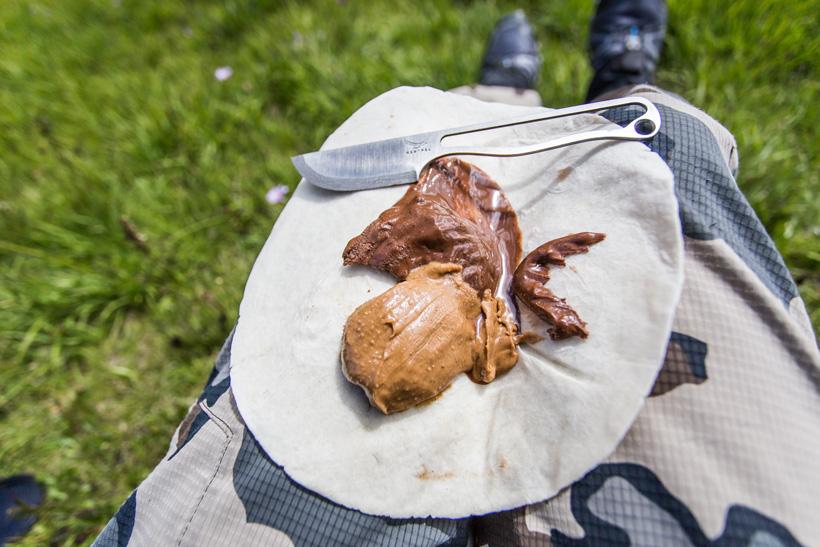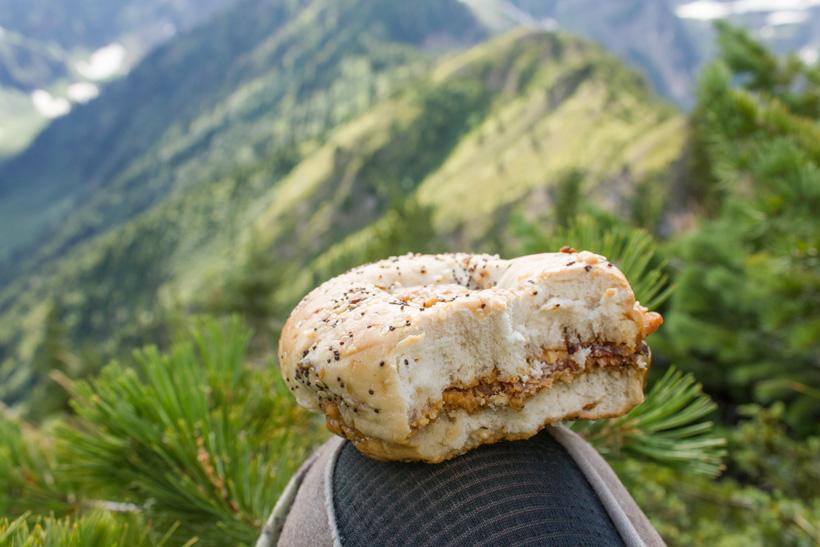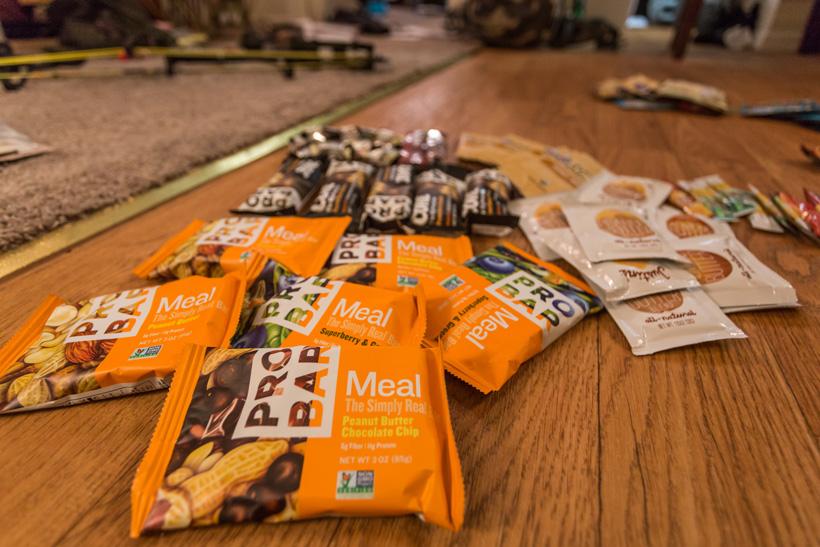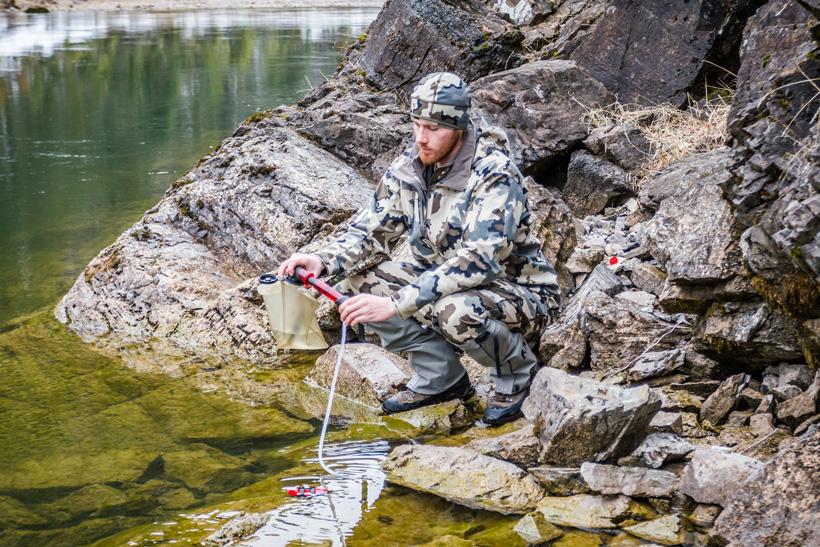




Photo credit: Brady Miller

Photo credit: Brady Miller
Nutrient | Nutrient |
|---|---|
Calories | Calories |
Nutrient | Protein |
Calories | 4 calories per gram |
Nutrient | Carbohydrates |
Calories | 4 calories per gram |
Nutrient | Fats |
Calories | 9 calories per gram |
Nutrient | Calories |
|---|---|
Nutrient | Calories |
Protein | 4 calories per gram |
Carbohydrates | 4 calories per gram |
Fats | 9 calories per gram |

Photo credit: Brady Miller

Photo credit: Brady Miller
Dieting and nutrition fads are all the rage right now. Whether it is gluten-free, paleo, or any other of the multitude of dieting trends right now, many seem to understand the direct correlation between diet and health. While some people need a special diet because of health issues or specific intolerances, everyone needs to be mindful of what they are eating. How should hunters approach nutrition? Is there a certain diet that is best for those who hunt in the backcountry? No, not necessarily. There is not a single diet that will meet everyone's needs; however, there are some general principles that will allow hunters to reach their full potential. Additionally, there are some specifics when it comes to nutrition for training. When hiking the terrain of the backcountry, understanding what these are will really help you as a hunter reach your full potential and recover quickly.
There was a time when I thought I understood nutrition pretty well. I was wrong. Nutrition is a complex science that people dedicate their lives to researching and understanding. Yet, there are some fundamental basics that everyone — especially hunters — should understand when it comes to nutrition. Everyone needs to understand what a calorie is and know the difference between fats, carbohydrates and proteins. You should also be aware of the different ways in which your body requires all three (that's right… your body requires all of these).
Calories are essentially a measure of the fuel that you receive from food and burn during activity. Without getting too technical, you burn a certain amount of calories in a typical day (anywhere from 1,500 to 3,000 depending on activity). When you are very active, this number goes up; when you are inactive, the number goes down. When you take in more calories than you burn, you gain weight; when you take in less calories than you burn, you lose weight. If you take in too few calories, your body goes into starvation mode: brain function reduces, energy levels go down, and lots of bad things start happening. The goal is to take in enough calories to properly fuel your body without overloading it.
Repeat after me: "Good fats are good; bad fats are bad." Fat is not a bad thing. It is not fat that makes you fat; poor eating and lack of discipline does that. Yes, trans fats, saturated fats and copious amounts of cholesterol are not good for you, but poly- and mono-unsaturated fats are very good for you. Additionally, fatty acids such as Omega-3 are crucial. Fats and fatty acids are necessary for proper organ function and joint health. Fats are required for assimilation of nutrients (getting nutrients where they need to go so that they are used properly). If you were to completely eliminate all fats from your diet, you could not properly absorb vitamins, proteins or amino acids. You need fat. Just make sure it is good fat.
Carbohydrates essentially come in two forms (simple and complex) and are responsible for nutrient absorption (getting nutrients from your stomach into your bloodstream). Simple carbs are those that absorb quickly like sugars and flour. Complex carbs digest slower and usually contain fiber. Simple carbs cause insulin levels to spike and cause your body to go into storage mode: holding onto fats and converting them to fat stores for use later. Complex carbs help insulin levels remain steady and help you go longer without feeling hungry. You should always try to minimize simple carb intake with two exceptions: (1) immediately after a workout or other physical activity. The spike in insulin allows you to absorb and use protein and other nutrients so simple carbs immediately after physical exertion, when coupled with vitamins and protein, are a good thing; and (2) fruit. Fruit is loaded with simple carbs because of the natural sugars, but it is also loaded with vitamins and nutrients that sugars help you to absorb. You should get plenty of complex carbs as these are good for digestive health and efficient absorption of nutrients.
Protein is the building block of muscle fiber. Without protein, your muscles cannot rebuild. Hunters are engaging in activity that requires muscle strength and endurance (carrying a pack, climbing steep hills and mountains, etc.), which means that hunters need more protein than those who participate in other outdoor activities. However, you cannot only eat protein and nothing else. Without carbs, you cannot absorb protein. Without fat, the protein will not get to your muscles. Protein must be consumed in conjunction with fats and carbs in order to maximize recovery and muscle rebuilding. Protein digests quickly so if you have a protein rich meal that does not also consist of fats and carbs, you will be hungry relatively soon.
Vitamins are crucial for every aspect of your health and it is difficult to get the full array of vitamins, minerals, and other essential nutrients in just your food alone. A multivitamin is a great addition to your diet to make sure that you are filling in all the nutritional gaps. You must understand, however, that you cannot eat like garbage, take a multivitamin and think that is all you need to be nutritionally balanced. Multivitamins are supplemental to a proper diet, not a replacement for it.
Now that we have a basic understanding of some of the fundamental elements of nutrition, here is some more technical information. First, it is important to understand how many calories are in each gram of protein, carbohydrate and fat. Here is how each one breaks down:
For someone who is active, the proper ratio of proteins, carbs and fats that are consumed on a daily basis should be determined based on the following formula: 1 gm protein/lb of body weight; 2 gms carbs/lb of body weight; and 0.2 gms fat/lb of body weight. Here is a real life example: I weigh 170 lbs. Based on the above formula, I should be consuming 170g of protein, 340g of carbs and 34g of fat daily. That means that I should be taking in roughly 2,346 calories per day. Yet, when activity increases or decreases, my caloric intake should also increase or decrease accordingly.
For hunters, calorie per gram is an essential formula that you must know. This formula tells you how many calories (fuel) are in each gram (weight) that you are consuming. Why is this so important? If you are packing your food in your hunting pack, weight is one of the most important factors you can consider. If your food has a low calorie to gram ratio (low fuel, high weight), your pack will be needlessly heavy because you will have to bring more food to get the right amount of calories.
When you are hunting, you are also burning a ton of calories. Sheep hunters can expect to burn anywhere from 8,000 to 11,000 calories per day! Western elk and deer hunters can expect to burn between 6,000 to 9,000 calories (or more) per day. To be blunt, there is no way you can keep up with your eating. You need to eat foods that are high in carbs and fats while also having some protein so that your caloric intake is high, your food sticks with you longer and your body is getting the nutrients it needs. A great rule of thumb is to bring food that provides at least 100 calories per ounce of weight.
No discussion of nutrition would be complete without talking about hydration. Water is the absolute most important thing you can put into your body. Without being properly hydrated, your other nutrition efforts are in vain. Also, without proper hydration, mental clarity, focus, proper organ function and memory all start to deteriorate. Many people get themselves into trouble in the backcountry because they let their hydration slip and then they get disoriented, confused and lost. You should be drinking 64 oz of water at a minimum every day and that number should go up at least another 50% while you are in the backcountry due to the increased exertion and time outside. Water may be heavy, but it will also save your life. When it comes to hydration, water is essential, but some other nutrients can aid in hydrating and recovering faster. Amino acids, sodium and potassium are all lost during perspiration. Replenishing these along with water will improve recovery (I like to use Wilderness Athlete's Hydrate and Recovery formula as it was formulated specifically for those in the outdoors who need to replenish hydration levels quickly). Try to avoid the excess amounts of sugar found in many commercial sports drinks as they improve taste but serve no functional benefit beyond what is needed to absorb nutrients.
It is hard to cover everything you should know about nutrition in one article. If you follow the information in this article, you will be well on your way to performing better, recovering faster and succeeding more. While nutrition and hydration are not as flashy as other forms of training and preparation, they make up the cornerstone on which everything else that we do is built. Eat right, train hard, drink water and hunt hard.
Nuts: peanuts, almonds, cashews, etc.
Seeds
Fish
Avocados
Dark chocolate
Eggs
Olive oil
Coconuts/coconut oil
Yogurt
Oatmeal
Multi-grain breads
Granola
Vegetables
Brown rice
Quinoa
Meats
Nuts: peanuts, almonds, cashews, etc.
Mushrooms
Greek yogurt
Milk
Beans
Trail mix
Jerky - either venison or beef (not a lot of carbs, but good fats and some protein)
Pro Bars
Builder Protein bars
Reese's peanut butter cups
Snickers
Granola